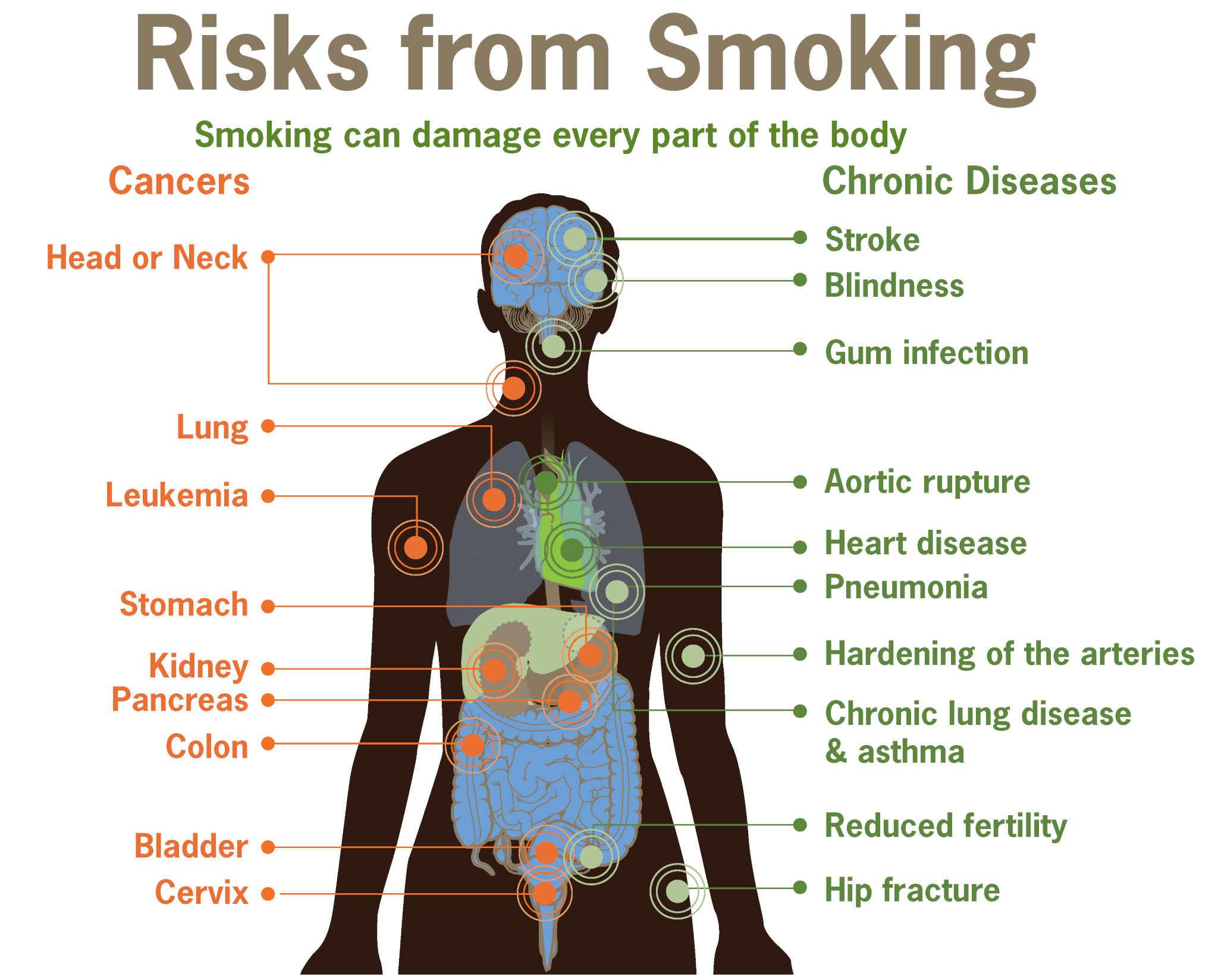Cancers
Smoking can cause cancer in almost any area in the body. The following list was pulled from the American Cancer Society website:
• Lung
• Larynx
• Oral cavity
• Nose and sinuses
• Pharynx
• Esophagus
• Stomach
• Pancreas
• Cervix
• Kidney
• Bladder
• Ovary
• Colorectum
• Acute myeloid leukemia
Lung cancer is one of the hardest cancers to treat and is the cause of death for 87% of male smokers and 70% of women smokers.
Heart Disease
Heart disease is the number one cause of death for smokers. Facts about smoking and heart disease pulled from WebMD:
Every cigarette you smoke makes you more likely to get heart disease. Roughly 1 out of 5 deaths from heart disease is directly related to smoking.
People who smoke are two to four times more likely to get heart disease. The risk is even greater for women who smoke and also take birth control pills.
Cigarette smoke is also bad for the people around you. Secondhand smoke can cause heart disease and lung cancer in people who don’t smoke.
Lung Disease
Smoking can cause Chronic Obstructive Pulmonary Disease (COPD). COPD includes emphysema and chronic bronchitis and is almost always caused by smoking. Some facts on COPD from the Center for Disease Control and Prevention website:
• Smoking accounts for as many as 9 out of 10 COPD-related deaths.
• COPD most often occurs in people age 40 and older with a history of smoking (either current or former smokers). However, as many as one out of six people with COPD never smoked.
• Smoking during childhood and teenage years can slow how lungs grow and develop. This can increase the risk of developing COPD in adulthood.
Buerger’s Disease
Buerger’s Disease is a condition of the blood vessels in the arms and legs. Clots form as a result of decreased blood flow. How does smoking relate to Buerger’s? The Center for Disease Control and Prevention says:
- Almost everyone with Buerger’s disease smokes cigarettes. However, Buerger’s disease can occur in people who use other forms of tobacco, like chewing tobacco.
- People who smoke 1½ packs a day or more are most likely to develop Buerger’s disease.
Researchers are working to understand how tobacco increases the risk for Buerger’s disease. One idea is that chemicals in tobacco irritate the lining of the blood vessels and cause them to swell.
Hypertension
One of the most common side effects of smoking is increased blood pressure, also known as hypertension. Nicotine causes your arteries to narrow and harden which leads to increased blood pressure. In turn, increased blood pressure can lead to strokes and heart attacks.
Gum Disease and Tooth Loss
Gum disease is an infection of the gums that can lead to tooth loss. How is smoking related to gum disease? The Center for Disease Control and Prevention says:
Smoking weakens your body’s infection fighters (your immune system). This makes it harder to fight off a gum infection. Once you have gum damage, smoking also makes it harder for your gums to heal.
What does this mean for me if I am a smoker?
- You have twice the risk for gum disease compared with a nonsmoker.
- The more cigarettes you smoke, the greater your risk for gum disease.
- The longer you smoke, the greater your risk for gum disease.
- Treatments for gum disease may not work as well for people who smoke.
Tobacco use in any form—cigarettes, pipes, and smokeless (spit) tobacco—raises your risk for gum disease.
For more help, buy my book “I Finally Quit …And So Can You: How to Gain Everything by Quitting.” There’s no better day than today to say, “I Finally Quit.”










Leave A Comment
You must be logged in to post a comment.